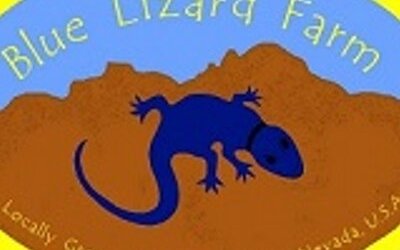Member Category: FarmMember Tags: argula, basil, beets, carrots, cucumbers, eggplant, garlic, green beans, hemp, herbs, honey, hot peppers, kale, lettuce, melons, pumpkins, radish, salad greens, spinach, squash, sweet peppers, tomatoes, turnips, and zucchini
Blue Lizard Farm is in Lincoln County, Nevada, 150 miles north and 2500 feet higher than Las Vegas. It’s a little cooler in the summer and a lot colder in the winter, and probably couldn’t be any more different than what usually springs to mind when people think of “Vegas”. The county is nearly the size of Vermont, but with only 5,500 people spread over six towns.
There isn’t a single traffic light in the whole county. It’s the kind of place where, for good or bad, everyone knows everyone. If you’re ever not sure what you’re doing, just ask your neighbor, because they’ll tell you. Kids run around being kids, and people chat in the grocery stores and post offices. There are parades down main street, fundraiser barbecues for the volunteer firemen and the VFW, and Little League games in the parks. It’s a pretty amazing place.
We came to Lincoln County in 2005, after spending six years in Las Vegas doing Africanized bee removal. Rodney is a self-taught beekeeper who began keeping bees in Tucson, AZ in 1992, about the same time Africanized bees became an issue in Southern Arizona. We did bee removal in Tucson for several years, then moved north with the Africanized bees to Las Vegas in 1999.
During our time in Vegas, Rodney had the opportunity to become a beekeeper for the University of Nevada, Las Vegas, maintaining research colonies for the Biology Department. It was there that we began to rekindle an interest in agriculture and a desire to get out of the city. When the chance to sell our business and start over on a new adventure appeared, well, we jumped on it and didn’t look back. We bought ten acres of sagebrush, saltbush, tumbleweed, assorted critters, and nothing else. We sunk a well, put in utilities, and set about trying to find a way to support ourselves off a small patch of desert.
And this is where we are today. We’ve got 13 20’×96’ steel-frame hoop houses and a state-inspected packaging facility. For several years, we grew a wide variety of produce, selling to Las Vegas restaurants. In 2017, we switched from growing vegetables to growing hemp which can be used both for its fiber and medicinal purposes. Hemp is a new and growing industry in Nevada, and we were excited to be one of the first Nevada hemp growers. In 2021, we returned to our roots of growing vegetables for our community. We still offer consultations for the hemp industry.
No Records Found
Sorry, no records were found. Please adjust your search criteria and try again.
Google Map Not Loaded
Sorry, unable to load Google Maps API.

